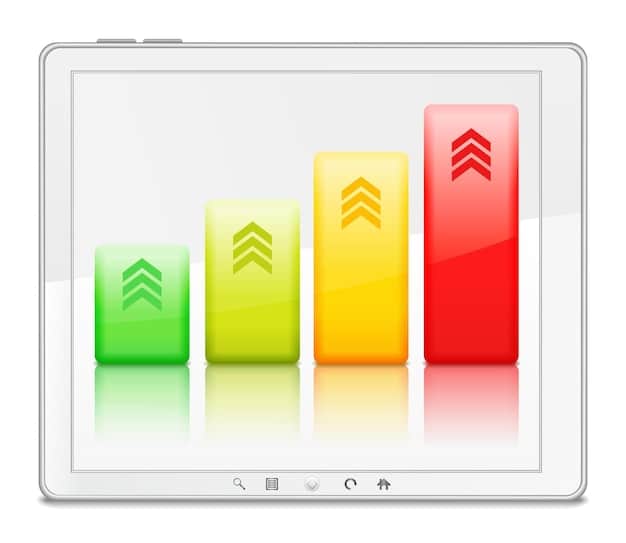Boost Your Credit Score: Simple 3-Month Strategies for Aussies

Looking to boost your personal credit score quickly in Australia? Discover simple yet effective strategies you can implement over three months to improve your rating and unlock better financial opportunities.
Are you an Aussie looking to **boost your personal credit score: Simple strategies to improve your rating in 3 months**? A good credit score can unlock better interest rates on loans, credit cards, and even help with renting a property. Luckily, improving your credit score isn’t an overnight miracle; it’s a process you can actively influence.
Understanding Your Credit Score in Australia
Before diving into strategies, it’s crucial to understand how credit scores work in Australia. Your credit score is a three-digit number that represents your creditworthiness. It’s based on your credit history, which includes your repayment behaviour, credit applications, and any defaults.
Several credit reporting bodies (CRBs) operate in Australia, such as Equifax, Experian, and Illion. Each CRB may have a slightly different scoring range, but generally, a higher score indicates a better credit rating.
Factors Affecting Your Credit Score
Several factors can impact your credit score, both positively and negatively. Understanding these factors is the first step in improving your rating.
- Repayment History: This is the most significant factor. Paying your bills on time shows lenders you’re a reliable borrower.
- Credit Applications: Applying for too much credit in a short period can negatively affect your score. Lenders may see this as a sign of financial stress.
- Defaults and Late Payments: Late payments, defaults, and bankruptcies severely damage your credit score.
- Credit Utilisation: Using a large portion of your available credit can lower your score. Aim to keep your credit card balances low.
Knowing these elements, we can tackle actions to help increase your credit score.

In conclusion, understanding the Australian credit system and the factors that influence your score is paramount before starting any improvement strategy.
Check Your Credit Report for Errors
One of the initial steps you should take is to obtain a copy of your credit report from each of the major CRBs. In Australia, you’re entitled to a free credit report every 12 months. Once you’ve obtained your reports, carefully review them for any errors or inaccuracies.
Errors on your credit report are more common than you might think. These can include incorrect personal information, accounts you didn’t open, or late payments that you made on time.
How to Dispute Errors
If you find any errors, don’t panic. Here’s how to dispute them:
- Contact the CRB: Each CRB has a process for disputing errors. You’ll typically need to fill out a form and provide supporting documentation.
- Provide Evidence: Gather any evidence that supports your claim, such as bank statements or payment confirmations.
- Follow Up: Keep track of your dispute and follow up with the CRB if you don’t hear back within a reasonable time frame.
Correcting errors can lead to an immediate improvement in your credit score. It guarantees the data used to calculate your score is correct, portraying a more accurate picture.
Pay Bills on Time, Every Time
Perhaps the most crucial factor in maintaining a good credit score is paying your bills on time. This includes credit card bills, loan repayments, utility bills, and any other recurring payments. Establishing a strong repayment history demonstrates to lenders that you are a reliable and responsible borrower.
Late payments, even just a few days overdue, can negatively impact your credit score. The effect of late payments will reflect in your credit score for a few months if not years due to the lenders’ scrutiny.
Tips for Staying on Top of Bills
Here are some practical tips to help you ensure you always pay your bills on time:
- Set Up Automatic Payments: Automate your payments wherever possible to avoid missing due dates.
- Use Calendar Reminders: Set reminders on your phone or calendar to remind you of upcoming bills.
- Consolidate Bills: Consider consolidating your bills to make them easier to manage.
Paying your bills on time is not only good for your credit score but also helps you avoid late fees and other penalties. By prioritising timely payments, you show accountability.
Reduce Your Credit Utilisation Ratio
Your credit utilisation ratio is the amount of credit you’re using compared to your total available credit. It’s a significant factor in determining your credit score. Experts recommend keeping your credit utilisation ratio below 30%.
For example, if you have a credit card with a $10,000 limit, you should aim to keep your balance below $3,000.
Strategies for Lowering Credit Utilisation
Here are some effective strategies for reducing your credit utilisation ratio:
- Pay Down Balances: Make extra payments on your credit cards to lower your balances.
- Increase Credit Limits: If possible, request a credit limit increase from your credit card issuer. This will increase your total available credit and lower your utilisation ratio.
- Open a New Credit Account: Opening a new credit account can increase your overall available credit, but be careful not to overspend.

By actively managing your credit utilisation ratio, you can improve your credit score. This tactic shows lenders that you are responsible with credit and not overly reliant on borrowed funds.
Avoid Applying for Too Much Credit
Applying for too much credit in a short period can negatively affect your credit score. Each credit application results in a hard inquiry on your credit report, which can lower your score.
Lenders may view multiple credit applications as a sign of financial distress. It could suggest that you are struggling to manage your finances or are desperate for credit.
Be Strategic with Credit Applications
Here are some tips for being strategic with your credit applications:
* Space Out Applications: Avoid applying for multiple credit products at the same time. Space out your applications by several months.
* Only Apply When Necessary: Only apply for credit when you genuinely need it. Avoid applying for store cards or other offers just to get a discount.
* Research Products First: Before applying for any credit product, research your options and choose the one that best suits your needs.
Exercising discipline with credit applications is crucial for maintaining a healthy credit score. Avoid impulsive decisions and only apply for credit when truly necessary.
Consider a Secured Credit Card
If you have a poor credit history or are new to credit, consider applying for a secured credit card. A secured credit card requires you to provide a security deposit, which serves as collateral for the card.
Secured credit cards are easier to obtain than unsecured cards because they pose less risk to the lender. By using a secured credit card responsibly, you can gradually rebuild your credit score.
How Secured Credit Cards Work
Here’s how secured credit cards typically work:
* Security Deposit: You’ll need to provide a security deposit, which is usually equal to your credit limit.
* Responsible Use: Use the card responsibly by making purchases and paying your bills on time.
* Credit Reporting: The issuer will report your payment history to the credit reporting bodies, helping you build credit.
* Unsecured Card: After a period of responsible use, you may be eligible to upgrade to an unsecured credit card and have your security deposit returned.
A secured credit card can be a valuable tool for individuals looking to improve their credit scores, as long as you use it properly.
| Key Point | Brief Description |
|---|---|
| ✅ Check Credit Report | Identify and dispute any errors on your credit report to ensure accuracy. |
| 💸 Pay Bills On Time | Set up reminders and automatise payments to avoid late fees and bad credit score. |
| 📉 Reduce Credit Usage | Keep the balance of your credit card below 30% of your credit limit. |
| 💳 Secured Credit Card | Apply for a secured credit card if is a starter or has poor credit history. |
Frequently Asked Questions (FAQ)
▼
The time it takes to see an improvement varies depending on your starting point and the actions you take. Some improvements may be visible within a few months, while others may take longer. Consistency is key.
▼
No, checking your own credit report does not hurt your credit score. This is considered a “soft inquiry,” which does not impact your score. Only “hard inquiries,” such as credit applications, can lower your score.
▼
If you’re struggling to pay your bills, contact your creditors and explain your situation. They may be willing to work out a payment plan or offer other assistance. Don’t ignore the problem, as it will only get worse.
▼
Negative information, such as late payments and defaults, will typically remain on your credit report for a certain period (usually several years). However, you can dispute inaccurate information. If the information is verified as incorrect, it must be removed.
▼
Generally, it’s not worth paying a company for credit repair services. You can take the same steps yourself for free by checking your credit report, disputing errors, and managing your finances responsibly.
Conclusion
Improving your credit score is a marathon, not a sprint. By following these simple strategies and staying consistent, you can **boost your personal credit score: Simple strategies to improve your rating in 3 months** and unlock better financial opportunities in Australia. Remember to monitor your progress, stay patient, and celebrate your successes along the way.





